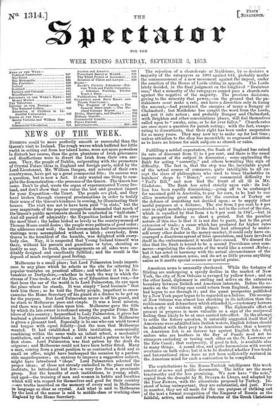The rejection of a church-rate at Maidstone, by so decisive
a majority of the ratepayers as 1003 against 643, probably marks the commencement of a new movement against the impost, under the sanction of the House of Lords sitting in appeals. The Lords lately decided, in the final judgment on the longlived "Braintree ease," that a minority of the ratepayers cannot pass a church-rate against the negative of the majority. The previous decisions, giving to the minority that power,—on the ground that the pa- rishioners must make a rate, and have a discretion only in fixing the amount,—had paralyzed the energies of many a Bunm or Chelmsford; but Maidstone has caught the word from the Lords, and put it into action ; and probably Bungay and Chelmsford, with Brighton and other conscientious places, will feel themselves called upon to "awake, arise, or be for ever fallen." Church-rates are once more a question for parish-voting; with the fact, exaspe- rating to dissentients, that their right has been under suspension for so many years. They may now try to make up for lost time; unless attention to the shop has meanwhile so engrossed attention as to leave no leisure for such subjects as church or rates.


























